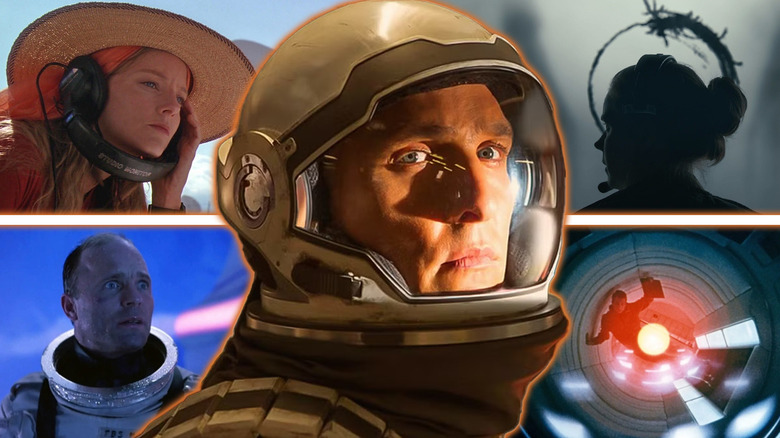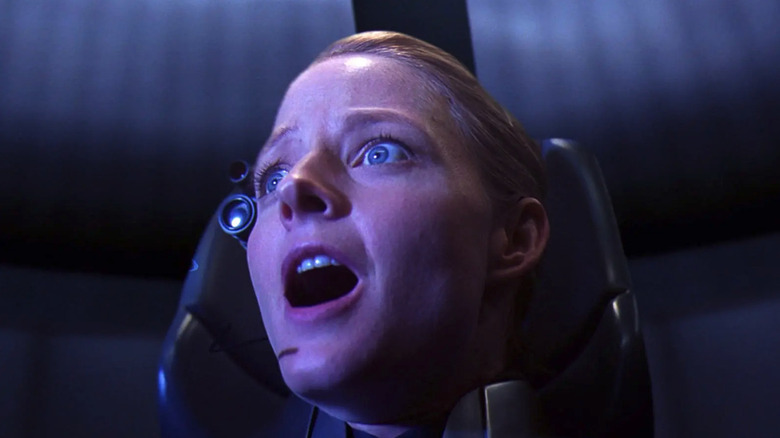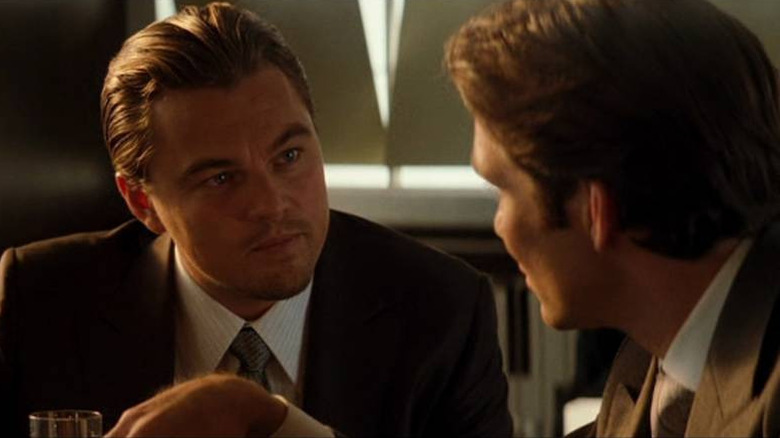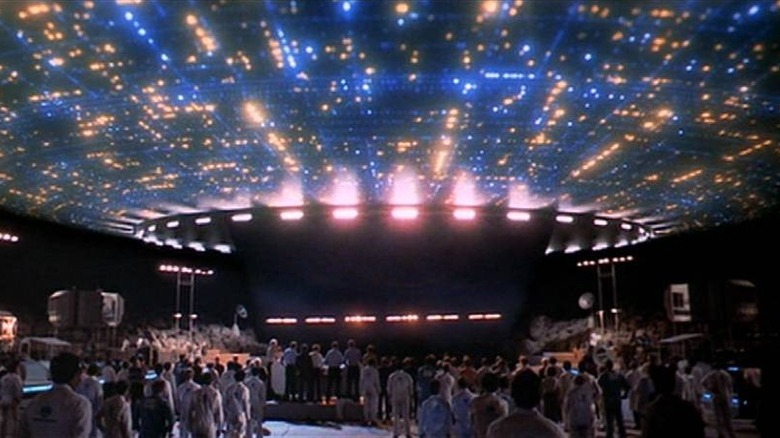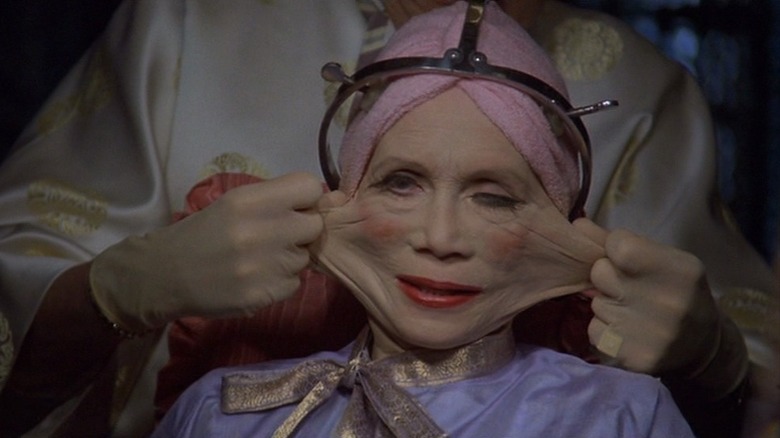20 Best Movies Like Interstellar
We may receive a commission on purchases made from links.
Upon completing "The Dark Knight" trilogy, director Christopher Nolan set out on arguably his most humanist work to date. "Interstellar" isn't just another run-of-the-mill science-fiction flick. Instead, it looks at the lengths humanity will need to go to if we're to save the species, exemplified in Coop (Matthew McConaughey) leaving his family to find another habitable world.
Everything in "Interstellar" is grounded in real science, even if certain liberties were taken since no one knows what really happens when you go into a black hole. But even if you aren't into data and numbers, there's a touching story at the heart of "Interstellar" showing how indomitable the human spirit is. After watching "Interstellar," you should definitely give yourself some time to reflect on what it all means. After that, you can dive into any number of these fantastic movies like "Interstellar" that involve space travel, explore science in entertaining ways, or make you look at the universe differently.
Contact
"Interstellar" and "Contact" are so similar it's easy to view the two as cosmically linked. They both star Matthew McConaughey in stories that explore humanity's place within the cosmos. Both are based on the works of famous astronomers, as "Contact" is based on a book by Carl Sagan while "Interstellar" worked heavily with Kip Thorne. And both utilize the concept of wormholes for interstellar travel.
"Contact" may have had a cursed production, but the result is a fascinating exploration between the intersection of science and faith. The film explores what it would be like if humanity received evidence of extraterrestrial life and how it would impact religion, something ignored by "Interstellar." "Contact" is worth a watch since it's so different from other alien films. There's no invasion and big action set pieces. Instead, it's more of a character drama about how sometimes people are required to take a leap of faith to discover something new.
Gravity
"Gravity" doesn't get bogged down in wormholes and theoretical science, and it's still one of the most ambitious sci-fi movies ever made. The technical craft is stupendous, as Alfonso Cuarón utilized the best in CGI technology at the time to show an astronaut, Dr. Ryan Stone (Sandra Bullock), trying to survive in space when her space shuttle gets obliterated by debris. It's the embodiment of the classic "man vs. nature" narrative, where Dr. Stone has to get resourceful and very lucky to make it back to Earth.
"Gravity" largely rests on the shoulders of Bullock's performance. Much of the film centers on her as she gets whipped around and makes daring leaps to find any vessel she can commandeer to survive. A focal point of "Interstellar" is how gravity can traverse dimensions, allowing Coop to send a message to his daughter through the black hole. The force of attraction winds up saving humanity there, but its destructive power is unquestionable in "Gravity."
Arrival
While "Interstellar" has the space voyage aspect lending a sense of adventure, "Arrival" is far more back-to-basics. It involves an alien race coming to Earth, and linguist Louise Banks (Amy Adams) has to figure out how to communicate with the extraterrestrials before other forces engage with violence. There's not much in the way of action, but the act of trying to talk is more than enough to keep audiences engaged.
Both "Interstellar" and "Arrival" deal with lofty concepts, and they're both fairly accurate in their fields. "Arrival" actually earned praise from expert linguists in how humanity would go about testing different ideologies to communicate with another advanced species. Both films also explore the idea that love is able to transcend space and time. Dr. Amelia Brand (Anne Hathaway) has a speech in "Interstellar" about how love exceeds cosmic limitations. Without spoiling the ending of "Arrival," a similar theme comes into play, about how love is capable of moving beyond time to where it's always been there and always will.
Ad Astra
/Film called "Ad Astra" a "science fiction masterpiece" in its review, and it's quite similar to "Interstellar," if you want more family drama amongst the stars. Roy Richard McBride (Brad Pitt) is an astronaut tasked with finding his lost father, who disappeared years ago searching for alien life, but now, his mission endangers the entire planet. In "Interstellar," Coop ventures toward the cosmos to save the world and his daughter. In "Ad Astra," Roy ventures out to stop his father so that the world might be safe.
As similar as the two films might be, particularly in the more realistic portrayals of space travel, they kind of have the opposite of meaning. "Interstellar" shows how love can transcend time and space, allowing someone like Coop to go on his extraordinary mission. However, "Ad Astra" is more about how humanity doesn't need to go toward the stars to find meaning. Forging strong relationships here on Earth is what being human is truly all about.
2001: A Space Odyssey
Any space film owes a debt to "2001: A Space Odyssey." Stanley Kubrick's epic sci-fi classic pioneered various special effects and offers an intellectual journey into what humanity's ultimate purpose is. Unlike "Interstellar" and many other modern blockbusters, "2001" doesn't concern itself with wrapping everything up in a neat, little package by the end. You're left to contemplate what it all means, but that's a big reason why the film continues to be dissected all these decades later.
"2001: A Space Odyssey" provides a philosophical journey as a group of astronauts and scientists go to investigate a mysterious monolith. There's the search for extraterrestrial life as well as the idea that humanity can invent something smarter than itself with the artificial intelligence system HAL 9000. The result is a film that examined the past, present, and potential future of humanity and where we might ascend to. Philosophical quandaries aside, it's a film that's still visually splendid to behold as quite literally every frame is a painting.
The Fountain
"Interstellar" may seem like a puzzling film upon first watch, especially once you get into all the tesseract moments. However, it's pretty easy to piece together what happened once you have a moment to collect your thoughts. If you want a true mind-bender of a film, you need to watch "The Fountain" from director Darren Aronofsky. Over a decade since it's come out, and a lot of people still have no clue what was going on in "The Fountain."
"The Fountain" consists of three stories working in tandem: A conquistador searches for the fountain of youth, a man tries to find a cure for his wife's cancer, and an astronaut attempting to reach a dying star. All three stories intersect to relate one cohesive narrative about the fear of death and how we all must accept it. All of the stories involve some attempt to stave off death just a little bit longer, but even though we can't stop it forever, we can at least make the most of life and spend time with those we love.
Inception
While "Interstellar" sees Christopher Nolan venture to the furthest reaches of space, "Inception" sees him looking toward the inner machinations of the human mind. The instant classic involves a reverse-heist of sorts where Dom Cobb (Leonardo DiCaprio) and his team must implant an idea within a business empire heir's dreams. But those dreams have dreams within them where time moves more slowly within each layer.
Looking at Nolan's filmography, it's readily apparent the filmmaker enjoys toying with time and the idea of linear narratives. "Memento" is told out of order, and "Tenet" has a closed-loop story entailing time inversion. And of course, "Interstellar" involves the team traveling to planets where gravity works differently, and they spend decades on one planet even though it only feels like hours. There are many ways of analyzing this, but as they relate to "Interstellar" and "Inception," time becomes of the utmost importance because you never know how much you have left.
Solaris (1972)
You can watch the 2002 "Solaris" remake starring George Clooney, but if you want to see an innovative piece of science fiction, you need to go to the original. 1972's "Solaris" from acclaimed Russian director Andrei Tarkovsky sees psychologist Kris Kelvin (Donatas Banionis) get sent on an interplanetary expedition to see what's gone wrong with a group of cosmonauts.
"Solaris" is almost three hours long, and it can read as slow at times, especially to moviegoers with more modern tastes. However, it's worth watching as a meditative journey more than anything else. Once viewers discover what's really happening on this other world, it invites a host of questions about the importance of memory to being human. Our memories are simultaneously the things that keeps us going in life's darkest moments, but they can also be a source of much trauma and discomfort. The visual language used in "Solaris" continues to be a touchstone for many sci-fi movies, including "Annihilation," "Event Horizon," and, yes, even "Interstellar."
Gattaca
"Gattaca" only deals with space travel in the loosest sense since Vincent Freeman (Ethan Hawke) has always wanted to be an astronaut. Unfortunately, he grows up in a futuristic society where people's genetic codes can be predetermined before birth. His lack of specialized sequencing, resulting in a heart defect, means he's stuck in a lower ring of society, so he has to pretend to be someone else to achieve his dreams.
"Gattaca" is a more grounded film, which is somewhat necessary due to its low budget, but it still manages to say a lot about the human condition while offering a scary glimpse into a prospective future. The concept of gene editing is feasible, even if certain traits still go beyond what's possible changing in a lab. Like "Interstellar," "Gattaca" uses high science to explore what it fundamentally means to be human because there are certain things about us that defy expectations, whether it's the willingness to fall into a black hole or swim way further out into the ocean than you should.
The Abyss
"The Abyss" often gets lost in the wider collection of James Cameron's filmography, but the truth is films like "Titanic" wouldn't exist without "The Abyss." The film involves an expedition to the ocean's depths to recover a boat, but upon descending far enough, they discover an advanced race that goes beyond anything humanity could comprehend.
However, there is seemingly one thing these life forms can understand, and it all comes back to that most powerful force in the universe referenced in "Interstellar." Love is the one constant that can traverse any depths and language barriers. Such humanist themes are essential for movies like "Interstellar" and "The Abyss" that can get lost in the gravity of lofty sci-fi ideas. "The Abyss" is also a crucial film within the advancement of computer-generated imagery, as the watery pseudopod effect was revolutionary when the film came out in 1989. Such effects undoubtedly paved the way for far grander water effects in another Cameron movie, "Avatar: The Way of Water."
Close Encounters of the Third Kind
Christopher Nolan has actually spoken about how 1977's "Close Encounters of the Third Kind" was a massive influence on "Interstellar." It's easy to see why, as it's yet another riveting sci-fi epic about a man, Roy Neary (Richard Dreyfuss), encountering an unidentified flying object. He goes on an epic quest to prove that he actually did see evidence of alien life while authoritative outlets attempt to find a way to communicate with these beings.
Few films have managed to capture a true sense of wonder and awe as well as "Close Encounters." There's a grandiose perspective of the eventual contact with alien life that makes it glorious to behold, not unlike how director Steven Spielberg handles the first show of dinosaurs in "Jurassic Park" to fill the audience with astonishment. Additionally, "Close Encounters" hits different once you have kids. Watching Roy alienate his wife and children is tough to watch at times, but that's also likely the case watching "Interstellar" as an adult, as Coop is willing to leave his family to save humanity at large.
Spaceman
What would "Interstellar" be like if Coop spoke with a giant spider the entire time? That's basically the conceit behind "Spaceman," in which astronaut Jakub Procházka (Adam Sandler) who gets sent to a mission on a space mission only to encounter a giant extraterrestrial spider Hanuš (voiced by Paul Dano). As alien as the creature might be, it plays a crucial role in helping Jakub sort out the problems he's having on Earth with his failing marriage to Lenka (Carey Mulligan).
"Spaceman" provides a dramatic turn for Sandler, who's always surprisingly pretty great in these types of roles. He's a man wrestling with regret over the way he treated Lenka and is now separated immeasurably from her. "Spaceman" is effectively a feature length version of the one sequence in "Interstellar," where Coop breaks down crying upon seeing how much of his daughter's life he's missed. The two films have a core theme that love can drive people to do amazing things even when they're far away from those in question.
The Creator
Given all of the current discussions surrounding AI, "The Creator" came out at the perfect time in 2023. Set in the aftermath of a AI detonating a nuclear weapon in Los Angeles, Joshua Taylor (John David Washington) is tasked with bringing in a powerful new weapon that turns out to be an AI in the form of a young girl, Alphie (Madeleine Yuna Voyles). "The Creator" deals with the existential threat of humanity being the source of its own destruction and ultimately creating something that could wipe us all out.
Even overlooking similar themes of love and regret, "The Creator" is similar to "Interstellar" in that both films are absolutely gorgeous to look at. /Film spoke with "The Creator" cinematographer Oren Soffer about bringing a level of authenticity to some of the more out-there futuristic imagery within the movie. The VFX are also second-to-none, even getting nominated for an Oscar for Best Achievement in Visual Effects.
The Martian
"The Martian" is one of the rare sci-fi movies where no one dies. Watching it is less about worrying about someone's safety and whether a team can come together to bring Dr. Mark Watney (Matt Damon) home after he accidentally got left behind on Mars during an expedition. Dr. Watney's stuck on Mars for quite a while, but he's resourceful and finds ways to feed himself and help as much as he can with the effort to bring him home.
"The Martian" and "Interstellar" belong to a select group of films where a core plot point involves rescuing Matt Damon in space. Damon has a small role in "Interstellar" as Dr. Mann, who wound up on an icy planet desperate to get rescued and almost sabotages the entire mission. "Saving Private Ryan" and "Courage Under Fire" also fall into this camp, although they're more war-focused as opposed to having any kind of sci-fi bent. Plus, on an emotional level, Damon needs saving from himself in "Good Will Hunting."
Primer
"Interstellar" manages to weave together incredible visuals with a complex storyline, all on a budget of $165 million. However, you don't need major studio backing to tell a story that gets people talking for years on end, as evidenced by 2004's "Primer." It was made for only $7,000, but its storyline still encourages discussion to this day, so feel free to consult this "Primer" primer if you need help deciphering the film's most confusing moments.
Two engineers accidentally discover time travel, and the new power fundamentally shifts their dynamic. "Primer" is absolutely devoted to keeping the science as fact-based as possible thanks to Shane Carruth, who wrote, directed, and starred in the film, having a degree in mathematics. The film also doesn't hold the audience's hand, unlike other sci-fi films that tend to dumb things down with simple metaphors. "Primer" pushes forward at full speed ahead into the confounding paradoxes inherent within time travel to where you may need to watch it two, three, or a dozen times to figure out what's going on.
Sunshine
Anyone in the mood for another journey into space to save humanity would benefit greatly from checking out "Sunshine." Director Danny Boyle's 2007 sci-fi flick (which should have started a trilogy) involves an expedition toward the sun, which has slowly started dying, to ignite a massive bomb near it so that everyone on Earth won't freeze to death. Similar to other films within this realm, "Sunshine" isn't so much concerned with how we would go about saving humanity but instead why humanity is worth saving in the first place.
At one point in the film, the spacecraft picks up a visitor, a human member of a prior attempt to reignite the sun, who then actively starts sabotaging the mission. It becomes a metaphor for how humanity's undoing will ultimately be brought onto ourselves, but that doesn't mean it's not worth fighting for. "Sunshine" is an exceptional thriller with great visuals and score accompaniments. There's a narrative shift that may throw some viewers off-guard, but don't let that deter you.
Brazil
For anyone who has ever felt they've never watched a movie that truly challenged them, "Brazil" is for you. It makes "Interstellar" seem as straightforward as "A Minecraft Movie," as it's set in a dystopian, overly bureaucratic world where Sam Lowry (Jonathan Pryce) sets out to find a woman appearing in his dreams while confronting a horrific world that doesn't make much sense, like being filled with overly convoluted machinery.
"Brazil" regularly adheres to absurdism, surrealism, and Kafkaesque logic where nothing makes sense to the rational mind. It's like George Orwell's "Nineteen Eighty-Four," one of the best dystopian novels, if it was written in the middle of an acid trip. It's essential viewing for any fans of the science fiction genre, seeing how it presents a ridiculous endgame for humanity's desire for peace by relinquishing any semblance of control or reason. If "Interstellar" makes you want to save humanity, "Brazil" may make you realize how complicated we made everything when the world was supposed to be simple.
Event Horizon
"Interstellar" is horrifying on an existential level as it deals with the possible complete destruction of humanity. But if you want a science fiction movie that offers true horror, "Event Horizon" is up your alley. It also deals with wormholes, but they aren't just a neat plot device. A crew is sent to find out what happened to a missing spaceship, and in the process, the crew comes across what's seemingly a portal to hell (or at least a hell-like dimension) where their deepest terrors become manifest.
Many space movies explore the utter beauty of the universe. Other planets, star systems, and black holes can look wondrous from a distance. But there's something to be said about sheer cosmic horror. Certain things may look beautiful, but there are undoubtedly things in our universe we can't hope to comprehend. "Event Horizon" expertly explores that territory, and there was even supposed to be a more gruesome version of the film that will sadly never see the light of day.
High Life
Many films about space travel hone in on the inherent goodness of humanity. People venture into the unknown to save billions of lives, and they have completely noble intentions. "High Life" looks a more depraved part of humanity in that it involves Earth sending a ship of criminals toward a black hole to basically function as guinea pigs as they collect alternative energy. The people on the ship are not there for selfless reasons, but there's also the cynical portrayal of a criminal justice system that's more than happy to send people to their deaths.
There's a great sense of depravity amongst the crew in "High Life." Violence becomes the norm, as isolation has caused some of the crew to lash out in horrific ways. "High Life" also makes excellent use of a nonlinear narrative, which may appeal to those who appreciate what Christopher Nolan has achieved with his own topsy-turvy plot structures.
Moon
Many space movies deal with loneliness and isolation. It makes sense given the predominant setting, but it's interesting to see what these different films have to say about community because people fundamentally require community. "Moon" sees Sam Bell (Sam Rockwell) come to the close of a three-year mission on the moon where he's been completely isolated except for an AI system until he discovers a doppelgänger is also there with him.
There's a revelation in the middle of "Moon" that completely changes how one has viewed the film up until that point. It brings a whole host of other ethical questions into the mix, particularly as they relate to corporate greed. Above all else, "Moon" is a fantastic showcase of Rockwell's talents, as much of the film relies on him interacting with himself. Rockwell's comedic timing is on full display, but he infuses it with genuine pathos to make for a perfectly compelling performance throughout the entire runtime.
